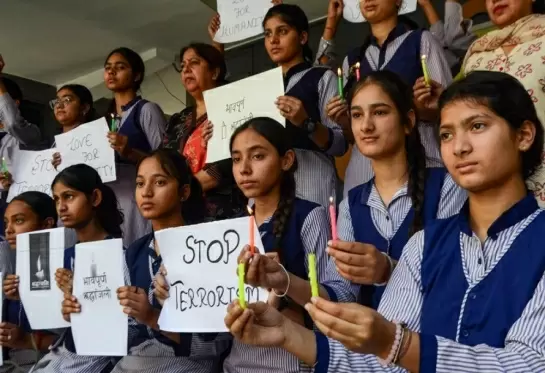Hong Kong: Pro-democracy bloc sweeps district polls
25-November-2019
Pro-democracy candidates on Monday claimed a resounding victory in all Hong Kong districts, winning 388 of 452 district council seats.
The alliance of pro-Beijing parties suffered a heavy blow, according to results on Monday, winning just 59 seats after going into the poll with almost 300, Efe news reported.
Independent candidates won five seats in the election, which saw a record turnout of 71.2 per cent.
"The candidates from the Democratic camp and allies won this election," lawyer Fed Li, a Democratic Party leader, told reporters on Monday.
"We hope our Chief Executive, Carrie Lam, received the same message, because the votes are the voice of the Hong Kong people."
Li said the results mean the local government should listen to the protesters' demands, which include universal suffrage and the release of political prisoners, and "especially setting up an independent inquiry into the incidents (of alleged police violence) in the past six months of protests".
In a statement, Lam, the Chief Executive of the Special Administered Region, admitted that the results "reflect people's dissatisfaction with the current situation and the deep-seated problems in society", adding that her government would "listen to the opinions of members of the public humbly and seriously reflect".
But Lam, who is backed by Beijing and pro-mainland parties, made no mention of the possibility of her stepping down, one of the protesters' main demands, and an issue which was debated by the Democratic Alliance for the Betterment and Progress of Hong Kong (DAB), whose president Starry Lee admitted the elections represented a "big setback".
Lee offered to step down as leader of the party - which only won 21 seats despite fielding 181 candidates. But the party's central committee rejected her resignation as it considered the election defeat a "collective failure".
Even though the difference between the two sides in terms of seats won is noteworthy, the actual number of ballots for each group is much closer, with pro-democracy candidates receiving 1.67 million (57 per cent) to 1.2 million (41 per cent) for pro-establishment candidates.
According to the results, pro-democracy politicians would now control all the 18 districts of Hong Kong, completely reversing the dominance of pro-establishment block.
The post of councilman has traditionally had little political relevance, with its powers limited to community issues, but these elections have assumed increased significance as a virtual referendum after protests rocked the city since June.
The unexpected landslide majority of the opposition is also important because it could help them establish a bigger presence in the committee of 1,200 members which is set to elect the next chief executive of Hong Kong, which has been traditionally dominated by Beijing allies.
Several protest leaders were among the successful candidates, at least nine of whom were the victims of violent attacks by counter-demonstrators during the unrest, such as Jimmy Sham or Andrew Chin.
Sham is the coordinator of the Civil Human Rights Front - which organized the largest demonstrations in Hong Kong's history last June - and Andrew Chin is from the Power for Democracy platform.
Both have been attacked during the protests, with Sham assaulted twice and Chin being bitten on the ear earlier this month by a man shouting pro-China slogans.
After his win in Lek Yuen district, Sham told the media that local elections were "a referendum", reflecting public opinion and its result was not a triumph for him, but all of Hong Kong.
Sham was attacked with a baseball bat and a knife in August by two masked men, although he emerged unharmed.
In October, he was beaten up by four people carrying hammers and wrenches, causing him head and arm injuries.
In the pro-China block, Junius Ho, widely disliked by protesters, failed to retain his councilman seat, sparking applause and cheers among pro-democracy movement voters.
According to his detractors, Junius, a lawyer aligned with Beijing, has links with local mafias who indiscriminately attacked people in subway stations of tourist areas to sow chaos during protests.
Junius was also attacked in early November by a person who approached him to take a picture but instead stabbed him.
Kelvin Lam, who replaced prominent activist Joshua Wong in the pro-democracy side's leadership, also won his seat.
Wong is one of the most visible leaders of the democracy movement that began in 2014 through the Umbrella Revolution, and the only candidate authorities prevented from contesting the elections.
Wong said Sunday before voting that his disqualification proved the city's elections were manipulated by China's Communist Party, but that he'd continue fighting for the rights to self-determination of Hong Kong people.
The elections on Sunday were held without any major incidents reported, despite over three million people turning out to vote.
Of the 4.1 million registered voters, around one million have been added to the rolls since the 2015 council elections, with the majority of the new voters consisting of first-time voters aged 18-20.
To avoid any further flare ups and clashes, polling stations were guarded by anti-riot police and over 30,000 police officers were deployed on Sunday.
The Hong Kong pro-democracy protests started peacefully in June to demand the suspension of a law allowing extradition to mainland China but continued with other demands even after the bill was revoked and have turned increasingly violent in recent weeks.IANS
Former DGP Om Prakash Murder: Wife Under Investigation, Says Minister
Ricky Rai, Son of Underworld Don Muthappa Rai, Shot at Near Bengaluru
Khushbu Sundar’s X Account Hacked; Actress Seeks Urgent Help
ED Raids Bengaluru Dog Breeder Who Claimed to Own Rs 50 Crore Wolf-Dog
Raj Thackeray Slams Hindi Imposition in Maharashtra Schools, Warns of Statewide Protests








